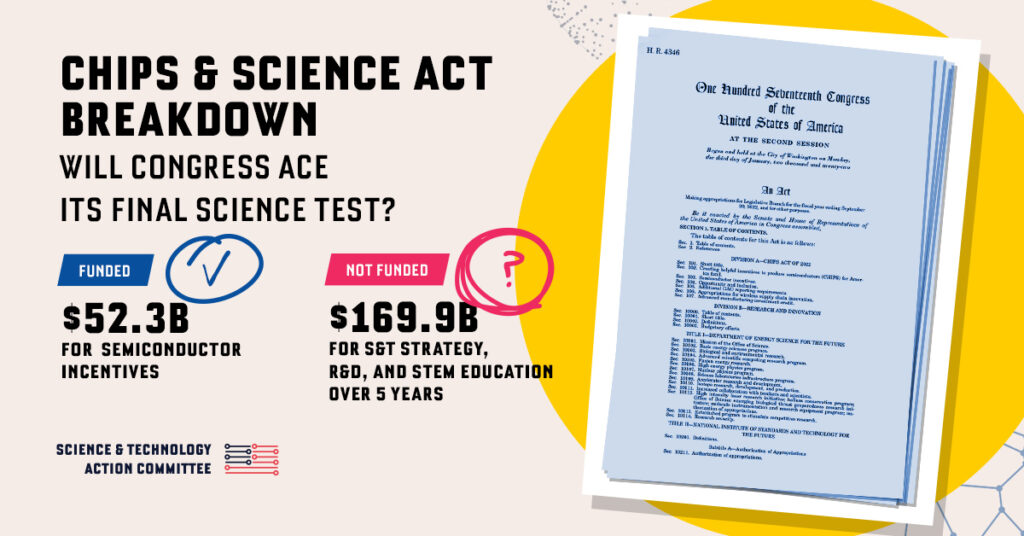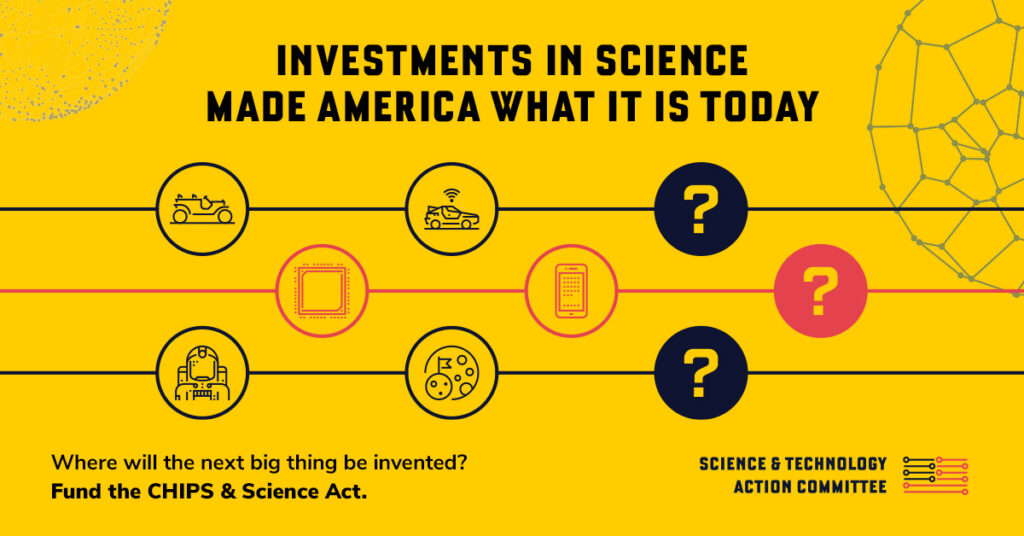Full Funding for Science Now Will Deliver More Jobs, More Security and a Less Hostile World Tomorrow
The next pandemic. Climate change. Food and water security. Clean energy production. A prosperous economy.
The greatest challenges we face in the decades ahead require the U.S. to unleash the full power of its advanced science and technology expertise. To do that, we must accelerate innovations already under development — and that requires significant investment.
Historic achievements by this Congress — namely the bipartisan passage of the CHIPS and Science Act as well as the climate, health and energy package — could provide just the fuel we need. In the final days of the 117th Congress, lawmakers on both sides of the aisle would be wise to use this period to secure science and technology funding increases for the upcoming year — and beyond — to enable the U.S. to meet the challenges coming at ever greater speed.

Whether we like it or not, we are engaged in a fierce competition with formidable international competitors, and without adequate funding we are in danger of losing by default. Sitting this battle out puts nothing less than our global leadership in science and technology at risk.
Nowhere is this more visible than in China’s push to overtake American leadership in science and technology. While President Biden and Chinese President Xi Jinping agreed in a historic bilateral meeting to keep competition between the two countries from falling into conflict, that doesn’t mean the U.S. should pull back on spending in this area.
At the peak of the space race, the U.S. government spent 1.9% of GDP on research and development. Today, that number stands at just 0.7%. Meanwhile, China and other nations have dramatically increased investments in this area and have the ability to surpass U.S. spending on research and development within a decade.
As both Democrats and Republicans rightfully sound the alarm on China’s growing strength in this area, we need a new space race to fuel the advancements of tomorrow, today. To continue U.S. leadership in the next half-century, we must not just match China’s pace but exceed it by doubling federal spending on science and technology relative to GDP to 1.4% by 2026.
History shows us what’s possible if we do: The push to put man on the moon in the 1960s helped create much of the technology we now take for granted. Everything from water purification systems to GPS, wireless headsets and CAT scans date back to the early days of space research and development.
And in the decades after the Mercury and Apollo missions, NASA continued to spin off technologies that we use every day from cameras small enough to fit on your smartphone to the technology that makes LASIK eye surgery possible.
Today, through advanced bioscience, clean energy, quantum computing, artificial intelligence and other cutting-edge technologies, we have the power to once again revolutionize the way we live and work — while also addressing the existential threats facing the nation and the world.

But if we allow China to take the reins of global leadership in science and technology, this next era of innovation won’t happen at home — and we won’t like the results: Fewer domestic jobs, intrusive and unethical uses of technology, and a more hostile and uncertain world.
When the U.S. fails to show up for science, it’s a loss for the entire global community on everything from combatting climate change to stopping the next pandemic and fighting food and water insecurity. The world expects the U.S. to lead on these issues, and until recently, has been watching to find out whether we would take the field.
Thanks to the determination of lawmakers earlier this year, we’ve finally taken the essential first steps. Now the question is whether Congress will use the lame-duck period to keep the momentum going by securing robust funding for science, technology, research and development.
Sudip S. Parikh, Ph.D., is a co-chair of the Science & Technology Action Committee and chief executive officer of the American Association for the Advancement of Science (AAAS). He served as science advisor and professional staff to Senate Appropriations Republicans from 2001-2009.
